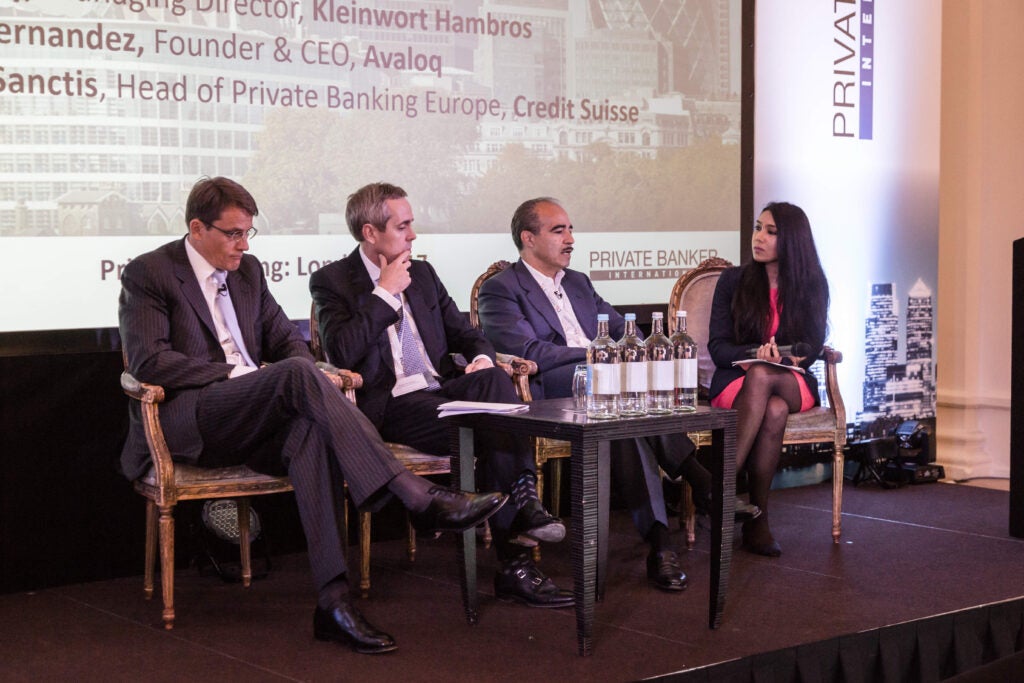The fourth Private Banker International London Conference 2017 on 8 June brought together professionals and experts from the private banking and wealth management industry to discuss key issues and themes that are influencing, shaping, and impacting the industry. Vania Goncalves gives you an overview of the day
The fourth Private Banker International London Conference 2017 took place at the Waldorf Astoria Hotel on 8 June.
The four sessions at the all-day conference were dotted with speakers from some of the world’s biggest private banks and technology vendors, including Credit Suisse, Kleinwort Hambros, UBS, Avaloq and Appway — just to mention a few.
Diverse themes were explored throughout the day, with speakers and panellists discussing the key opportunities and challenges in the industry, the growing demand for digitalisation, the influence of artificial intelligence (AI), the evolving needs and behaviours of wealthy clients, and what the “Uber” moment of private banking can be, alongside other key topics.
Session One: The evolving private banking landscape and London’s status in 2017
Panel members and speakers:
Paul Kearney, managing director, Kleinwort Hambros
Francisco Fernandez, founder and CEO, Avaloq
Dena Brumpton, CEO of wealth & investments, Barclays (speaker only)
Claudio de Sanctis, head of private banking Europe, Credit Suisse
Moderator:
Meghna Mukerjee, editor, Private Banker International
The conference began with an opening keynote speech by Paul Kearney of Kleinwort Hambros. Kearney said that he is a “survivor of the consolidation” in the industry, recalling the acquisition of Kleinwort Benson by Societe Generale Private Banking.
With regards to the evolving private banking landscape, Kearney said that “we appear to be on the brink of a new dawn, the realisation of AI”, mentioning that the familiar jargon is being supplanted by “daily active users activation lengths, virality, [and] red traffic potential”, as “we are rushing headlong to become more digital”.
Kearney has also highlighted the need to “pay careful attention” to what “our digital strategy is” and that “not all innovation is good innovation”. “The challenge of choosing the right strategy seems to me to hinge on two dilemmas, both the direction of the innovation and the speed.”
The second presentation came from Francisco Fernandez of Avaloq. Fernandez spoke about the power of disruption and the rise of AI.
He said that Avaloq is “promoting disruption as any other player in the financial industry” and that disruption can’t be stopped. “I think we can do something against disruption: what I call self disruption.”
On the innovation point, Fernandez suggested that many fintech ideas might be illegal at the beginning, but they will become legal later on, as regulators “don’t want to kill innovation”.
Fernandez said it is crucial to have a “deep understanding” of customer behaviour. Considering the attitudes of millennials, he said that according to a recent study, “71% of the millennials would rather go to the dentist than listen to the banker”.
Fernandez suggested that AI is on the rise and “will outperform tasks done by investment officers and portfolio managers today”, and added that banks will not be able to solve all the problems in house. “If we don’t collaborate, if we don’t open up, we cannot be fast enough,” he added.
Dena Brumpton of Barclays Wealth & Investments Management delivered the third presentation of this session. She spoke about the importance of keeping up with the evolving needs of clients.
Brumpton said that the next generation of wealthy clients will demand an immediate, transparent, technologically friendly and unique service and that achieving those four goals is going to be challenging. She added: “Young or old, the buying behaviour of our client base is changing”.
Clients are now interested in the impact of their investment decisions, said Brumpton, suggesting that the industry will have to address this in the future. Brumpton also said: “The biggest disruption for us as an industry is going to come from data availability and APIs.”
The fourth presentation came from Claudio De Sanctis of Credit Suisse who spoke about the needs of the next generation.
De Sanctis said that by listening to what his own children would expect from their “ideal private bank”, it is obvious that the next generation is different.
He added: “In the next 20 to 30 years, there is going to be $41trn of wealth moving from one generation to another” and that he was shocked to find out the “92% of young adults who inherit money from their parents change bank”.
De Sanctis also talked about the importance of orchestrating relevant networks for the next generation of clients, and also discussed the Young Investor Organisation (YIO) or community that Credit Suisse created ten years ago.
The first panel discussion, chaired by PBI’s editor Meghna Mukerjee, drilled deeper into the topics discussed during the presentations.
Kearney, commenting on the dynamics of the Kleinwort Hambros merger, saying he was nervous about the two organisations coming together. However, he added: “The culture of the two firms was remarkably similar and we were quick in bringing the two teams to the same location.”
The conversation touched upon other challenges private banks are facing. Fernandez said: “The hurdles are often within the organisations, because they love what they have and try to protect their existing assets. I say this is not good enough.”
Commenting on the challenges and advantages of networks, De Sanctis said: “The advantage is survival. The disadvantage is the loss of control.”
During the audience Q&A session, a question posed to the panel was: In this change environment, how do you know whether you are up with the curve, ahead of the curve or behind the curve as an organisation?
De Sanctis said: “The problem with the digitalisation and disruption is that disruption happens so fast, and by the time you are getting the feedback you are behind the curve and it may be too late to correct it. So, in that sense I do fear that we are all a bit blind, and we just need to do our best to remain competitive.” Fernandez added: “If you ask me, I always feel behind the curve, that’s why we are probably ahead”.

Session Two: Servicing today’s clients, identifying their needs and preferences
Panel members and speakers:
Richard Parkin, head of pensions policy, Fidelity International
René Hürlimann, head of sales, EMEA, Appway
Thomas Schaer, digital innovations lead, Appway (speaker only)
Hugo Borges, regional market head of Africa & Europe, Private Bank, Standard Chartered Bank
Edward Thomas, new business manager, Oxfam (panel member only)
Moderator:
Oliver Williams, head & co-founder, WealthInsight
Richard Parkin of Fidelity International opened the second session by exploring the subjects of pension drawdown and clients’ goals.
Parkin said that one of the big mistakes in the UK is to talk about income drawdown as a single product. He added that in Fidelity they categorised people who use drawdown by goals: those who want to take their money out of their pension savings as “quickly as they can”, those who are focused in leaving the pension for the next generation and those who want to turn it into an income.
Clients are now interested in doing all of those things from a single account, said Parkin. “That presents us with a number of challenges, first of all having multiple goals to be met from a single account, second each of those goals have different risk return profiles.”
Parkin also highlighted that retirement goals these days aren’t just income based. He added: “The retirement goals themselves need to be managed actively, not to reflect risk, but to really help people drive more value out of their invested retirement savings. This risk of leaving money on the table I think is a much bigger concern than the risk of running out.”
The second presentation of the session came from René Hürlimann and Thomas Schaer from Appway, who spoke about automation and customer experience.
Schaer said that user expectations are a main driver for automation and that there are three key areas that need paying attention – convenience, rapidness, and personalisation.
He also said that private banks have to be able to provide “modern communications channels”, like a chatbot. “It’s not about getting rid of the client advisor through work automation, it’s about facilitating the daily business, the daily job of the client advisor.”
Appway ended the presentation with a live demo successfully showing that something as simple as updating your address could be done via a chatbot without going into a physical bank branch.
The third and final speaker of this session was Hugo Borges of Standard Chartered Private Bank, who spoke about maintaining strong client relationships with an African perspective.
Borges mentioned the importance of building relationships at an early stage and keep reviewing and adapting the coverage market. Borges also explained that the brand is instrumental in attracting and retaining the ultra high net worth (UHNW) assets.
“Finally it is about the management of reputation and operating risks because this is a key component of value management,” he said.
The panel discussion of session two was chaired by Oliver Williams, head & co-founder of WealthInsight. Edward Thomas from Oxfam, joined the discussion and said that the next generation views ethical investments, philanthropy and being socially responsible as a “much higher priority”.
Borges added that among the UHNW segment in Africa, the new generation of clients, educated in some of the world’s best universities, have a different way of approaching ethical investments, and that private banks might have to “start looking at that area as an asset class on its own right”.
Asked whether regulation is driving the demand for digital solutions, Hürlimann said: “If you just look for compliance through digitalisation, the user experience will not be great.”
During the audience Q&A, one of the questions posed to the panel was: How do we adjust our traditional pension way of thinking to emerging markets, such Nigeria and Ghana?
Parkin said: “The products may be different, the regulatory environment may be different, but I think the principles themselves are pretty universal. It’s about trying to tailor those principles”.

Session three: Broadening out from the traditional private banking premise
Panel members and speakers:
Simon Kingsnorth, global head of digital marketing, Citi Private Bank
Sándor Szabó, Key Account Manager, Dorsum
Ali Sadr, chairman, Pilatus Bank
Nick Middleton, co-head, UBS SmarthWealth
Andrew Reid Thomas, head of sales, Europe, InvestCloud (panel member only)
Moderator:
Bartosz Golba, head of wealth management, GlobalData
The third session’s opening presentation came from Simon Kingsnorth at Citi Private Bank, who spoke about technology trends and the need for personalisation in the industry.
Kingsnorth explained that the private banking industry “has not been brilliant” in innovating and keeping up with the pace of technology pace which “has never been faster than it is now”.
He added that a lot of banks “struggle to get their data into a good shape”. “Getting the right people on the right strategy in place for data is essential for your personalisation strategy.”
The second speaker of this session, Sándor Szabó, key account manager at Dorsum, spoke about how AI can help in client acquisition.
Szabó said that advisors should be able to reach clients when they are not “physically closer” to them. He then explained how private banks can acquire new clients through Dorsum’s chatbot – how friendly conversations can take place and advisors can “step into the conversation, or modify the questions being asked or the entire procedure if needed”.
Szabó also spoke about how a virtual advice solution can help in “deepening or keeping the client relationships alive”, for instance by receiving investment advice on their mobiles.
The third presentation came form Ali Sadr of Pilatus Bank, who mentioned that the “Uber moment” of banking will come from “lowering the thresholds that private banks still holds”, so that they can serve the mass affluent clients who control “the highest amount of wealth” and are “left alone”.
He added that if private banks can bring together “high touch with high tech”, that would lead to the Uber moment of banking.
The final speaker of session three was Nick Middleton of UBS, who spoke about the opportunities that robo-advisors can present to traditional wealth managers.
Middleton said the industry has to think about the way clients want to engage. “We can’t be in a position where we have to catch up. We have to be on this wave now.”
He highlighted the importance of convenience, adding: “People are busy, no one has time to go and find advisors. Rather than being a threat to our industry, robo-advisors and digital technology actually helps to enhance and augment our businesses.”
The conference’s penultimate panel discussion was chaired by Bartosz Golba of GlobalData. Andrew Thomas from InvestCloud joined the panel.
Kingsnorth said that one of the key trends in customer experience and private banking is personalisation. “Nowadays is not difficult to be personalised through technology. There is a huge amount of tools available.”
Middleton added: “As an industry we segment people in a very simplistic ways. We segment clients based on wealth but that’s not how we should segment clients. We should segment clients based on their requirements and their complexity.”
Commenting on the cost of digitalisation, Thomas said the most important aspect is to test the solutions out first before rushing into creating a robo or digital advisor. He added: “You want to be cost-effective on one side but don’t provide a generic offering that does not differentiate you.”

Session four: Private Banking in UK and Europe — What should we expect?
Panel members and speakers:
John Saunders, managing director of US and Europe, Coutts International
James Flemming, vice chairman, Arbuthnot Latham & Co. (panel member only)
Jonathan Davis, UK managing director, Avaloq (panel member only)
Mouhammed Choukeir, chief investment officer, Kleinwort Hambros (pane member only)
Alexandra Altinger, CEO, Sandaire Investment Office (panel member only)
Moderator:
Ian Woodhouse, senior business advisor, Orbium
John Saunders of Coutts International opened the fourth session. He spoke about the future of private banking, saying: “I think we can expect different technologies to drive greater fragmentation on one hand, but newer forms of collaboration on the other. In part, it is driven by regulative imperatives and in part because I don’t see the established players being able to simply absorb fintech as they start to create new ground or going into existing market share.”
Saunders also explained that those engaging in cross border activity will have to be aware of the many regulations and be “very clear about what those rules mean”.
The final panel discussion was chaired by Ian Woodhouse of Orbium, and focused on whether the UK will retain its top financial status after Brexit.
Joining the panel were James Fleming of Arbuthnot Latham & Co., Jonathan Davis of Avaloq, Mouhammed Choukeir of Kleinwort Hambros, and Alexandra Altinger of Sandaire Investment Office.
Choukeir focused on how London is a global powerhouse in the financial industry. “The reason that London has that number one status is perhaps partly because it is part of the EU, but a lot of the clients that we speak to bank through London for other reasons — the human capital, the infrastructure, the rule of law, [and the] regulation. In that context, we think London will retain and continue to be a source of comparative advantage.”
Altinger added: “I do think that there are still loads of unknowns, but it is important to recognise that London has profiled itself as one of the premier financial wealth management centres in the world.” Davis agrees that London will remain a strong centre, but there will be “greater uncertainties” ahead.
Commenting on the impact Brexit will have on regulations, Fleming highlighted that there is a “great concern” about the “potential loss of passport”.
He said: “We will no longer be able to send people onto the continent to sell products, businesses will have to consider selling out subsidiary companies or changing their business models entirely and that’s a major feature.”
Altinger said that she doesn’t see “any change to the directionality” of the regulation that is in place.
Saunders added that once the rules are set, they are not going to be about taxes, but more about cross border compliance.

The PBI London Conference was followed by a gala dinner and awards ceremony.







